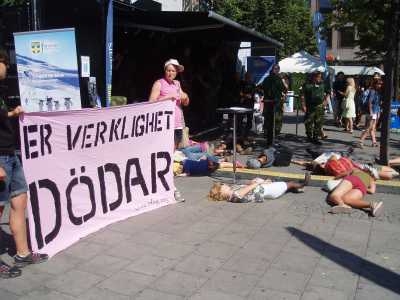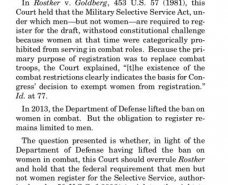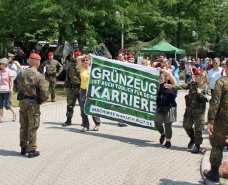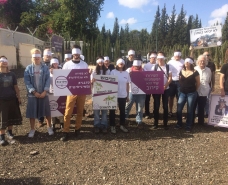Recruitment of and resistance by queers - example Sweden

In this article we will explain how we understand in what ways politics about gender, sexuality and war are related to each other. We will also tell you about some actions Ofog (anti-militarist network) did against the Swedish Armed Forces participation in the last Pride festival (August 2011).
We are both activists active in various movements; peace, feminist, no border and queer. We do not see these struggles as separate but as parts of the same struggle. For example you cannot maintain an anti-militaristic struggle without also working against borders: against national ones as well as those between "us" and "them”, since these borders legitimize and are a prerequisite for war and militarization. Another example is that war and militarism depend on and reinforce an oppressive, controlling and racist social order, which clearly tells whose life is worth defending and who's not. To justify the Swedish Armed Forces involvement in war, the image of an external enemy must be created and maintained. Also, a united “we” must be established, as in “we whose lives are worth defending”.
Militarism is an ideology rooted in the heterosexist system, which forms social norms for gender/sex and sexuality. Militarism, just as society in general, is based on the construction and assumption of two opposite genders; one that is in need of protection (feminine) and one that protects (masculine), and their mutual interdependence and attraction. Militarism defines masculinity as powerful and aggressive, and femininity as humble and passive, and thus reproduces the construction of gender/sex. _Heterosexism also includes the presumption that everyone (or at least most people) is heterosexual and that heterosexual relationships are ‘normal’ and therefore superior. These assumptions and prejudices about gender/sex and sexuality have been used, and are still used, to marginalize, discriminate and criminalize LGBT-people who challenge the legitimacy of these norms. When governments make war a priority and increase the dependence on the military they reinforce a heterosexist, patriarchal culture and intensify the stigmatization of those who challenge this culture.
For us it was therefore evident to interfere when the Swedish Armed Forces took part in the Pride festival last summer. They participated in the Pride Festival with the slogan "Openness - part of our reality". This was part of their recruiting campaign "Welcome to our reality", where they promoted themselves as a challenging, exciting and open workplace. At the Armed Forces recruitment tent in the "Pride Park" we did a die-in with a banner saying "your reality kills". With this action we wanted to show what their reality really is about: war and death, that the reality of military operations is based on violence and the threat of violence. Our action was quite efficient and we blocked their tent for a few hours.
In the Pride parade, which concludes the Pride festival, the organization for LGBT-soldiers marched, in military uniforms, with a big truck with the slogan "Openness - part of our reality". We walked beside them the whole parade with speech bubbles saying:
"My job kills",
"I'm just as good at killing as heterosexual soldiers" and
"Here I walk defending my human rights, while my job is is about violation of other people’s human rights".
When asking the military about their purpose of participating in the Pride festival, they didn't answer us. But for us, the purpose of the military’s presence at Pride is quite clear: to legitimize, and conceal their activities of war and death by marketing themselves as human rights promoters and open to everyone (including LGBT people).
As the society gets more and more militarized, the acceptance increases for repression of dissidents and persons who don’t follow the social norms. This applies both for the regions where war is being waged, as well as the ones where they are being waged from. LGBT-people and other marginalized groups in society are among the first in danger of suffering violence and abuse in a climate of militarism, violence and fear. Therefore it is fundamental that we continue the struggle against war and militarization, and as part of this don’t let the military hijack any struggle that should be about human rights for everyone. The struggles against oppressive structures based on gender/sex and sexuality are essential in the struggle against militarization. Consequently, we need to continue the work against heterosexism, transphobia and patriarchy, in our own movements as well as in the rest of the society.
Cattis Laska and Hanns Molander
Ofog - direct action for peace
Countering Military Recruitment

WRI's new booklet, Countering Military Recruitment: Learning the lessons of counter-recruitment campaigns internationally, is out now. The booklet includes examples of campaigning against youth militarisation across different countries with the contribution of grassroot activists.
You can order a paperback version here.








